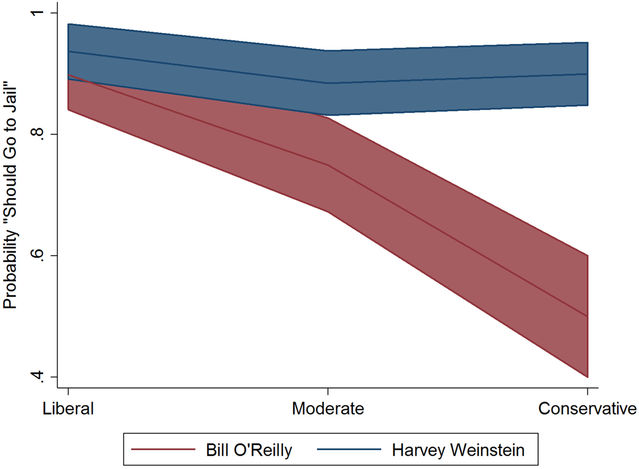Sexual Abuse
Liberals and Conservatives Disagree on Sexual Harassment
New research points to key differences in moral views.
Posted December 14, 2018
The recent and controversial confirmation of Donald Trump’s U.S. Supreme Court nominee, Brett Kavanaugh, caused widespread public debate. Following multiple accusations of sexual assault, Kavanaugh had the highest opposition of any of the Supreme Court nominees over the last two decades and a majority of the country opposed his nomination.
Public opinion polls have revealed a sharp divergence in the views of Democrats and Republicans: whereas 91 percent of Democrats opposed the confirmation, only 6 percent of Republicans did.
But how much of that actually has to do with differences in Republicans’ and Democrats’ attitudes about sexual misconduct? Our new research, along with a growing compendium of polling data, suggests that the partisan divide on the Kavanaugh nomination is consistent with a large partisan divide in Americans’ reactions to allegations of sexual harassment.
An experiment with Bill O’Reilly and Harvey Weinstein
Following widespread public outrage over sexual misconduct charges levied against Hollywood producer Harvey Weinstein and TV host Bill O’Reilly, my colleague Costas Panagopoulos and I decided to conduct a national survey experiment.
The aim was to determine whether conservatives and liberals reacted differently when sexual misconduct allegations were made about one of “their own.” Drawing on previous research, we hypothesized that conservatives would express less concern about sexual harassment as a problem in society and would be less likely to condemn a member of their own (in)-group compared to a member of the opposing (out)-group.
To test this, we partnered with the public opinion firm YouGov to conduct an online experiment with about 1,000 Americans. The survey used quotas representative of the U.S. population. We randomly assigned half of the participants (n = 500) to either the “Bill O’Reilly” or “Harvey Weinstein” condition. All participants first read the following:
“Sexual harassment in the workplace, or unwelcome sexual advances, requests for sexual favors, or conduct of a sexual nature that makes someone feel offended, humiliated or intimidated, is a form of sex discrimination and is illegal in the United States.”
Participants were then reminded about the fact that either “Bill O’Reilly, a prominent conservative” or “Harvey Weinstein, a prominent liberal” had recently lost their jobs as the result of sexual harassment allegations. We explicitly mentioned the ideological orientation of both celebrities so that regardless of familiarity with the cases, participants could still deduce in-group vs. out-group affiliations.
We then asked participants to make two judgments. First, how big of an issue they believe sexual harassment currently is in the United States, and second, if the allegations are proven to be true, whether they believe O’Reilly/Weinstein should go to jail.
Overall, a majority of our sample (75 percent) thought that sexual harassment was somewhat to very serious issue, but this figure masked strong partisan differences. On a scale of 0 (not serious) to 10 (very serious), liberals rated the issue to be more serious (8.3), on average, whereas conservatives rated it slightly above neutral (6.1).
Moreover, out of those respondents who did not think either should go to jail, conservatives made up the majority (49 percent, versus only 14 percent of liberals). The odds of condemning Weinstein were significantly higher compared to O’Reilly, but we find clear differences by political ideology.
As shown in the Figure, among liberals in the survey, 90 percent said they thought O’Reilly should go to jail. But there was no evidence of “in-group” favoritism, with 94 percent saying the same about Weinstein. Of course, some respondents may have known that the charges about Weinstein also involved sexual assault, which may have influenced their responses. Nonetheless, few liberals were willing to cut either celebrity a break.

On the other hand, while 90 percent of conservatives said Weinstein should go to jail, just 50 percent said the same about O’Reilly. Conservatives, then, appeared to view the allegations against a conservative media icon as less serious than those against a liberal movie producer. These results are robust even when adjusting for the influence gender, age, race, education, and whether or not someone reported to having been personally harassed.
Many polls show Republicans and Democrats have diverging views about sexual misconduct
The findings from a single experiment are certainly not iron-clad proof that conservatives and liberals view allegations about sexual misconduct differently. Differences in the details of the Weinstein and O’Reilly cases could explain why conservatives showed more in-group favoritism than liberals. But our findings are consistent with other data on the same issue.
For instance, a 2017 YouGov poll revealed that Republicans are much less likely (31 percent) than Democrats (65 percent) to view sexual harassment as a very serious issue in society. Republicans are also less likely than Democrats to sanction their own when it comes to sexual harassment.
For example, in September, a majority of Republicans (54 percent) told pollsters that Kavanaugh should be confirmed regardless of whether the allegations about him were true. In the face of sexual harassment allegations against O’Reilly, a 2017 YouGov survey found that only 15 percent of Republicans thought Fox News should have canceled his show.
Meanwhile, Republicans were fast to condemn the other side, with 61 percent believing that the allegations against Weinstein were credible. But what about Democrats? An even larger number of Democrats (69 percent) condemned Weinstein.Similarly, a 2017 Politico survey reported that roughly equal numbers of Democrats found the sexual harassment claims against both Trump (65 percent) and Bill Clinton (64 percent) credible. (By contrast, although 69 percent of GOP voters agreed on the allegations against Clinton, only 37 percent found the allegations against Trump credible.)
Lastly, whereas a majority of Republicans (59 percent) agreed that Al Franken (a Democratic senator from Minnesota who was accused of sexual harassment) should resign, they were much more forgiving when it came to allegations against Roy Moore, a Republican U.S. Senate candidate in Alabama: Only 35 percent of Republicans called for him to drop out.
Conservatives and liberals rely on different “moral foundations”
What explains these differences? One possibility is that such biases occur when one side views a particular issue as more "objectionable" than the other side. Another, related possibility is that liberals and conservatives rely on what scholars refer to as different “moral foundations.”
Moral Foundations Theory argues that conservatives and liberals differ in the way they espouse “individualizing” values – concerns about equality, justice, fairness, and harm – and “binding” foundations, which include in-group loyalty, authority, and purity. In particular, conservatives are more likely to value strong loyalty to their “tribe,” justify the status quo, and resist social change. In contrast, liberals tend to prioritize concerns about social justice, fairness, and avoiding harm to others.
In short, the polarized reactions to sexual misconduct allegations against powerful people may not simply reflect contemporary politics, but also more enduring differences in the way conservatives and liberals view the world.
(This blog post is a modified version of an article that appeared inThe Washington Post).
References
van der Linden, S., & Panagopoulos, C. (2018). The O'Reilly factor: An ideological bias in judgments about sexual harassment. Personality and Individual Differences, 139, 1, 198-201.
Jost, J.T., van der Linden, S., Panagopoulos, C., & Hardin, C.D. (2018). Ideological asymmetries in conformity, desire for shared reality, and the spread of misinformation Current Opinion in Psychology, 23, 77-83.




